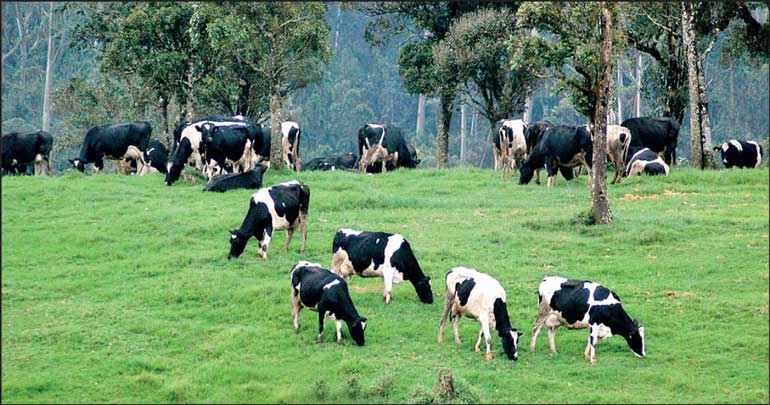Saturday Feb 21, 2026
Saturday Feb 21, 2026
Tuesday, 13 February 2024 01:41 - - {{hitsCtrl.values.hits}}

The All Island Dairy Association (AIDA) yesterday warned of death knell for industry following the unprecedented Government move of bringing it under the Value Added Tax (VAT) regime.
Hitherto the industry was VAT exempt and expressing concerns over the potential impact of the steep increase of 18% VAT on the dairy sector, AIDA proposes a series of measures to alleviate the burden and encourage sustainable growth.
AIDA’s primary recommendation involves implementing the VAT hike gradually, coupled with supportive measures. This phased approach would enable the dairy industry to adapt to the change while offering relief for essential inputs, thus easing the transition period.
To boost productivity and reduce local production costs, they suggest facilitating the import of feed ingredients. Additionally, the association advocates for granting the private sector access to underutilised land resources through Government schemes, encouraging large-scale intensive dairy farming, fodder cultivation and silage production under mutually beneficial long-term leases.
AIDA further proposes the cultivation of fodder/maize on paddy fields during the Yala season and between the Maha and Yala seasons, catering to the needs of small and medium-scale dairy farmers.
Strengthening cooperatives and promoting the production of value-added dairy products emerges as another vital recommendation put forth by AIDA. By enhancing profitability within the sector, these initiatives aim to fortify the dairy industry against economic challenges.
Moreover, AIDA emphasises the importance of proactive monitoring and consumer awareness initiatives. It suggests assigning the Department of Animal Production and Health (DAPH) the responsibility of tracking the VAT’s impact, recommending policy adjustments, and conducting consumer awareness campaigns to educate the public about the VAT’s implications.
AIDA called on the Government to reconsider the proposed VAT increase, recognising its potentially far-reaching and detrimental consequences on the dairy sector, rural livelihoods, and the overall health and well-being of the Sri Lankan population.
They noted that the dairy sector, which experienced substantial growth with a peak production of over 400 million litres of milk from 2017 to 2021, now finds itself in a precarious situation.
The VAT hike threatens the profitability of the sector and contradicts the Government’s objective to boost dairy production by 53%.
Previously, fresh milk production and fresh milk-based products were exempt from VAT, providing essential support to around 300,000 small-scale farmers and over 2 million dependents directly or indirectly involved in the sector.
“The potential ramifications of the VAT increase are multi-faceted. The economic stability of the dairy sector, crucial for the well-being of farmers and the broader rural economy, is at risk. The sector experienced a 1.33% decline in 2022, indicating its sensitivity to economic fluctuations. The proposed VAT increase could exacerbate this vulnerability, leading to a more pronounced dip in production and real income losses for farmers,” they highlighted.
They also pointed out that the cost of producing a litre of milk surged by 174% between 2013 and 2022, primarily due to rising input costs such as feed ingredients. Retail prices have followed suit, increasing by 168% in the same period.
“The additional burden of increased VAT could further strain the affordability of dairy products, potentially leading to a decline in consumption. This has dire consequences for public health, particularly among vulnerable groups, intensifying the country’s existing malnutrition challenges,” they said.
The association stressed the economic implications extend beyond the dairy sector itself, noting that anticipated price increases in dairy products, integral to the Sri Lankan diet, could result in a significant decline in consumption, estimated to be around 30-40%.
“Such a downturn in dairy consumption has ripple effects across ancillary sectors, including packaging, transportation, and retail, potentially leading to job losses and decreased income for workers in these related fields,” they added.
Members of the All Island Dairy Association are key stakeholders in Sri Lanka’s dairy sector, contributing to the collection of nearly 60% of the country’s daily milk produced by farmers and processing 200 to 250 million litres of fresh milk annually. The VAT increase, however, threatens the viability of local dairy products, forcing consumers towards less expensive imported alternatives.
AIDA emphasises the current challenges faced by producers and processors, highlighting the struggles in marketing local products. Processors producing UHT milk in one-litre packs using local fresh milk have seen a significant drop in sales, leading to discounts at a loss to move products.
“Local fresh milk is already more expensive than imported milk powders, and the VAT increase only worsens the situation,” they maintained.
Compounded by rising prices in concentrate feed and grazing lands for dairy cattle, the VAT scheme could cripple the local dairy industry, already in turmoil. AIDA warns that consumers may shift away from locally produced fresh milk-based products, opting for cheaper imported powdered milk powders.
“These policy recommendations seek to safeguard the interests of the dairy industry and promote its sustainable growth amid evolving economic conditions,” they pointed out.